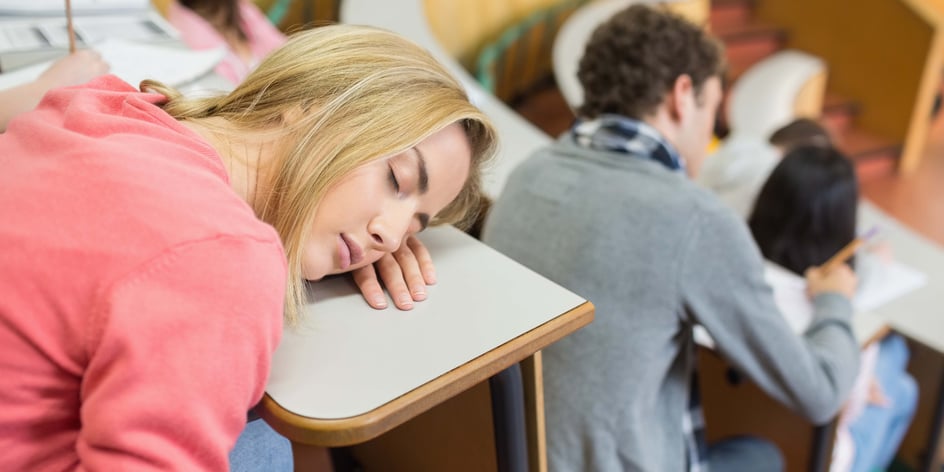8 Tips for Better Sleep in College

It isn’t always easy to get a good night’s sleep when you’re in college. But sleeping well can benefit your mental and physical health — and even your GPA. Here are a few ways to improve the quality of sleep you get — even if you’re living in a noisy dorm.
If you’re in college, chances are you suffering from sleep deprivation. According to the Sleep Foundation, the source for many of the expert tips in this article, young adults between the ages of 18 and 25 need from seven to nine hours of sleep per night, but more than half of college students sleep less than seven hours a night during a typical semester and even less during finals week. In one study, 60 percent of college students surveyed reported “poor quality” sleep, with almost 30 percent reporting symptoms of a sleep disorder.
Numerous studies have shown that sleep deprivation negatively affects thinking, attention span, memory, decision-making, and energy — all things students need for success in college. In fact, getting more sleep may lead to better grades. One study, published in the Proceedings of the National Academy of Sciences, found that college students who slept longer each night at the beginning of an academic term ended that term with higher GPAs.
Unfortunately, some of the “best practices” for good sleep hygiene — such as going to bed and waking up at the exact same time every day and reserving your bedroom exclusively for sleep — are not always possible for college students who typically have inconsistent class, work, and social schedules, and who may share a dorm or apartment with others. Yet making a few small adjustments to your environment and routine can help improve the quality and quantity of sleep you get in college. Here are a few strategies that sleep experts suggest.
1. Improve Your Sleep Environment
One often noted piece of advice for better sleep is to keep your bedroom exclusively for sleeping. But for college students sharing small living spaces, such as a typical dorm room, this just isn’t feasible. Your room — and more likely your bed — may be your only personal space and where you study, eat, socialize, and relax between classes.
Even so, it is possible to make your bedroom or dorm a better place for sleeping. Some things to think about:
- Temperature. According to the Sleep Foundation, doctors usually recommend a room temperature somewhere between 60 and 67 degrees Fahrenheit for the most comfortable sleep.
- Light. Natural and artificial light affects our production of melatonin, a hormone released in the evening that makes us feel tired and helps our bodies prepare for sleep. According to the Sleep Foundation, even normal indoor light levels can suppress melatonin production and interfere with your sleep-wake schedule. Hanging black-out shades over your windows, using a sleep mask, and dimming the lights in the hours before bed, may help.
- Noise. Noise is common in dorms and apartments. Ear plugs and white noise machines (even a fan) can help drown out noise from neighbors or roommates.
- Your bed. While you might be stuck with an uncomfortable dorm mattress, try purchasing a quilted mattress topper, a good pillow, and a cozy blanket or comforter you like so that your bed is as comfortable as possible. Do your best to keep your bed mostly for sleeping and relaxing. Use your desk for studying or study elsewhere.
2. Create a Bedtime Ritual
Even if you can’t always go to bed at the same time each night, or you need to study late into the evening, it’s important to follow a consistent bedtime routine, say sleep experts, which provides a signal to your brain that bedtime is near.
Your ritual can include anything that is calming and relaxing to you, such as:
- Yoga and meditation
- Reading a book (not related to school)
- Journaling
- Taking a warm bath or shower
- Listening to sleep music
Sticking to the same routine each day will help condition your body and brain to respond to the routine with relaxation and sleep.
3. Don’t nap too long or too late in the day
Research has shown that naps of 20 minutes or less are beneficial, while longer naps can push you into deeper stages of sleep and leave you feeling groggy when you wake up. Other research cited by the Sleep Foundation points to the benefits of 90-minute naps, which let your body go through one entire sleep cycle without interruption. It’s important, say experts, to take naps in the early afternoon, before 3 p.m. Napping later in the day may disrupt your nighttime sleep.
4. Avoid screens before bed
Your computer and cell phone emit blue light which reduces or delays the production of melatonin. In fact, Harvard researchers found that blue light suppresses melatonin production to an even greater degree than the white lights in your home or dorm. Another study done by researchers in Japan showed that blue light also reduces the amount of time you spend in slow-wave and REM sleep, which is important for optimal brain function.
Sleep experts advise shutting down all electronic devices at least 30 minutes to one hour before bed followed by a relaxing activity that doesn’t involve screens. When using electronic devices before bed, also consider
- Using the “bedtime” or “nighttime” mode on your phone, which reduces blue light emissions and decreases the brightness setting. On some devices you can set bedtime mode to turn on and off automatically at specific times.
- Turning down the brightness on any screen as much as possible.
5. Exercise at the right time
You may have heard that exercising too close to bedtime can make it difficult to fall asleep. Because exercise releases endorphins and raises body temperature, exercising close to bedtime can interfere with sleep in some individuals. However, researchers at Johns Hopkins University discovered that moderate daily exercise (about 30 minutes) actually helps some people fall asleep faster and spend more time in the important, restorative, deeper stages of sleep.
Another study from Harvard University found that as long as you finish your workout at least one hour before bedtime, exercise shouldn’t adversely affect your sleep quality, but this can vary from person to person.
6. Start your day with sunlight
Sunlight plays a big role in setting our natural body rhythms and our sleep/wake cycles. As soon as morning light streams into our eyes, our body clocks synch up with the 24-hour day. Our brain stops making melatonin (the sleep hormone) and begins making cortisol (the awake hormone).
A number of studies have shown that when people get from 15 to 30 minutes of natural sunlight early in the day, they fall asleep earlier and more easily, are less likely to have trouble sleeping, and are more alert during the day. So, as soon as you get up in the morning, try to get outside as soon as possible, or at least open your window shades and let the natural light in.
7. Watch your alcohol and caffeine intake
According to sleep experts at the University of Michigan, alcohol and caffeine impact your quality of sleep in different ways. Caffeine affects the quality of your sleep cycles after you fall asleep; alcohol, can initially help you fall asleep, but make it difficult to stay asleep. Sleep experts recommend stopping caffeine consumption eight hours before bedtime and alcohol consumption three hours before bedtime.
8. Agree on a lights-out policy
It’s likely that you don’t have the exact same bedtime schedule as your roommate or roommates, but you might be able to agree on a “lights out” policy, where lights in your room are turned off or dimmed at a certain time. Roommates can study quietly or be on their phone or tablet just as long as the room is dark.
While sleeping and college life may seem incompatible, it’s important to understand why sleep is important for students and to make sleep a priority. Getting enough sleep can reduce stress, help you stay mentally and physically healthy, and help you retain all the information you’re learning in class. Making even small lifestyle changes can have a big impact on your sleep.



